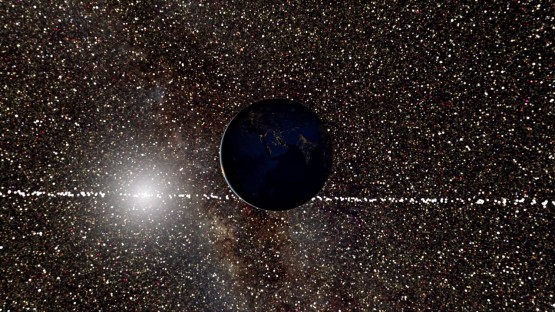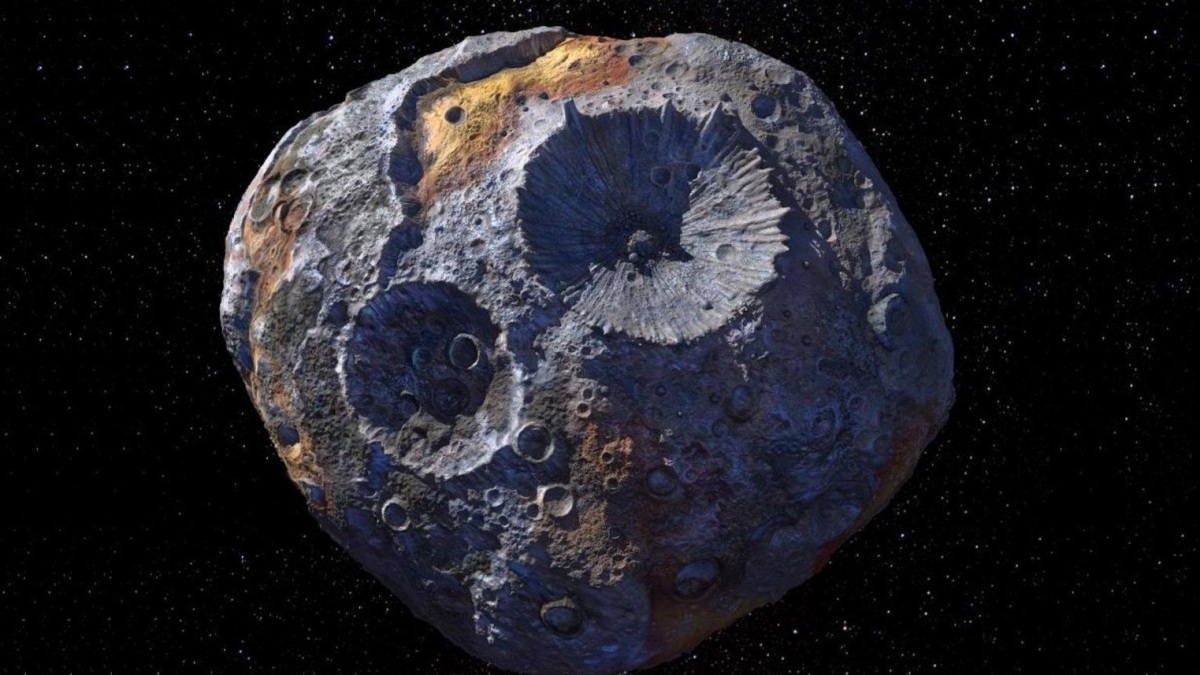-
Welcome to TechPowerUp Forums, Guest! Please check out our forum guidelines for info related to our community.
You are using an out of date browser. It may not display this or other websites correctly.
You should upgrade or use an alternative browser.
You should upgrade or use an alternative browser.
Solar System
- Thread starter Drone
- Start date
- Joined
- Jul 5, 2013
- Messages
- 31,945 (7.26/day)
My personal opinion, I think it's equally likely that both may have had life on some basic level.Mars versus Venus.... Which has got more chance of life?
Last edited:
- Joined
- Jul 5, 2013
- Messages
- 31,945 (7.26/day)
So you think Earth is the only place life can or could exist?I always think that there was no life on Mars or any other planets in the Solar System. What are the real facts that prove there could be life on them even in the past? The weird 50 years of research and nothing else. They always find different arguments about life on the and then they find arguments against life there.
- Joined
- Aug 20, 2007
- Messages
- 22,553 (3.45/day)
- Location
- Olympia, WA
| System Name | Pioneer |
|---|---|
| Processor | Ryzen 9 9950X |
| Motherboard | MSI MAG X670E Tomahawk Wifi |
| Cooling | Noctua NH-D15 + A whole lotta Sunon, Phanteks and Corsair Maglev blower fans... |
| Memory | 64GB (2x 32GB) G.Skill Flare X5 @ DDR5-6200(Running 1T no GDM) |
| Video Card(s) | PNY RTX 5080 OC |
| Storage | Intel 5800X Optane 800GB boot, +2x Crucial P5 Plus 2TB PCIe 4.0 NVMe SSDs, 1x 2TB Seagate Exos 3.5" |
| Display(s) | 55" Hisense 55U8N 4K FALD Display |
| Case | Thermaltake Core X31 |
| Audio Device(s) | TOSLINK->Schiit Modi MB->Asgard 2 DAC Amp->AKG Pro K712 Headphones or HDMI->B9 OLED |
| Power Supply | FSP Hydro Ti Pro 850W 80Plus Titanium PSU |
| Mouse | Logitech G305 Lightspeed Wireless |
| Keyboard | WASD Code v3 with Cherry Green keyswitches + PBT DS keycaps |
| Software | Gentoo Linux x64 / Windows 11 Enterprise (yes it's legit) |
What are the real facts that prove there could be life on them even in the past?
Phosphine is pretty damn convincing. And that's a recent "real fact."
- Joined
- Jul 5, 2013
- Messages
- 31,945 (7.26/day)
Have to agree here. Phosphine is a very strong bio indicator. There are no known naturally occurring non-biological processes that can produce that compound. That's not to say it isn't possible, it's just unknown and the only known process is biological.Phosphine is pretty damn convincing. And that's a recent "real fact."
Sorry, we have another asteroid on it's way. It's going to be close.
Low quality post by ThrashZone
- Joined
- Feb 20, 2020
- Messages
- 9,340 (4.72/day)
- Location
- Louisiana
| System Name | Ghetto Rigs z490|x99|Acer 17 Nitro 7840hs/ 5600c40-2x16/ 4060/ 1tb acer stock m.2/ 4tb sn850x |
|---|---|
| Processor | 10900k w/Optimus Foundation | 5930k w/Black Noctua D15 |
| Motherboard | z490 Maximus XII Apex | x99 Sabertooth |
| Cooling | oCool D5 res-combo/280 GTX/ Optimus Foundation/ gpu water block | Blk D15 |
| Memory | Trident-Z Royal 4000c16 2x16gb | Trident-Z 3200c14 4x8gb |
| Video Card(s) | Titan Xp-water | evga 980ti gaming-w/ air |
| Storage | 970evo+500gb & sn850x 4tb | 860 pro 256gb | Acer m.2 1tb/ sn850x 4tb| Many2.5" sata's ssd 3.5hdd's |
| Display(s) | 1-AOC G2460PG 24"G-Sync 144Hz/ 2nd 1-ASUS VG248QE 24"/ 3rd LG 43" series |
| Case | D450 | Cherry Entertainment center on Test bench |
| Audio Device(s) | Built in Realtek x2 with 2-Insignia 2.0 sound bars & 1-LG sound bar |
| Power Supply | EVGA 1000P2 with APC AX1500 | 850P2 with CyberPower-GX1325U |
| Mouse | Redragon 901 Perdition x3 |
| Keyboard | G710+x3 |
| Software | Win-7 pro x3 and win-10 & 11pro x3 |
| Benchmark Scores | Are in the benchmark section |
Hi,
Refrigerator size drama queen much lol
Refrigerator size drama queen much lol
- Joined
- Sep 1, 2010
- Messages
- 7,023 (1.29/day)

ESO’s Very Large Telescope
Anemic Star Cluster Breaks Metal-poor Record – W. M. Keck Observatory

"Touchdown declared" on asteroid, NASA probe attempts to collect samples for return to Earth
The dramatic effort to collect a sample is the centerpiece of an $800 million mission.

Smile, wave: Some exoplanets may be able to see us, too | Cornell Chronicle
Some exoplanets – planets from beyond our own solar system – have a direct line of sight to observe Earth’s biological qualities from far, far away, according to research led by Lisa Kaltenegger, director of the Carl Sagan Institute.

Bennu, a well-preserved, ancient asteroid, is currently > 321 million km from Earth and offers scientists a window into the early solar system as it was first taking shape billions of years ago and flinging ingredients that could have helped seed life on Earth.
ALMA Shows Volcanic Impact on Io’s Atmosphere
Voyager 2 still working.
Space Lynx
Astronaut
- Joined
- Oct 17, 2014
- Messages
- 18,397 (4.68/day)
- Location
- Kepler-186f
| Processor | 7800X3D -25 all core |
|---|---|
| Motherboard | B650 Steel Legend |
| Cooling | RZ620 (White/Silver) |
| Memory | 32gb ddr5 (2x16) cl 30 6000 |
| Video Card(s) | Merc 310 7900 XT @3200 core -.75v |
| Display(s) | Agon QHD 27" QD-OLED Glossy 240hz |
| Case | NZXT H710 (Black/Red) |
| Power Supply | Corsair RM850x |
that is insane lmao
- Joined
- Jul 5, 2013
- Messages
- 31,945 (7.26/day)
Thought Voyager2 was written off because they though the power supply had run down. Guess not! Or maybe I was thinking of Voyager1...
Space Lynx
Astronaut
- Joined
- Oct 17, 2014
- Messages
- 18,397 (4.68/day)
- Location
- Kepler-186f
| Processor | 7800X3D -25 all core |
|---|---|
| Motherboard | B650 Steel Legend |
| Cooling | RZ620 (White/Silver) |
| Memory | 32gb ddr5 (2x16) cl 30 6000 |
| Video Card(s) | Merc 310 7900 XT @3200 core -.75v |
| Display(s) | Agon QHD 27" QD-OLED Glossy 240hz |
| Case | NZXT H710 (Black/Red) |
| Power Supply | Corsair RM850x |
Thought Voyager2 was written off because they though the power supply had run down. Guess not! Or maybe I was thinking of Voyager1...
ah I was thinking of Voyager1 too. lol woops.
still 12 billion miles away is mighty impressive imo
- Joined
- Jul 5, 2013
- Messages
- 31,945 (7.26/day)
Indeed. And this new radio array is going to make communications much better in many ways.still 12 billion miles away is mighty impressive imo
Indeed. And this new radio array is going to make communications much better in many ways.
What's impressing me is they can still transmit & receive from that distance. Where is the cut-off point.
- Joined
- Aug 20, 2007
- Messages
- 22,553 (3.45/day)
- Location
- Olympia, WA
| System Name | Pioneer |
|---|---|
| Processor | Ryzen 9 9950X |
| Motherboard | MSI MAG X670E Tomahawk Wifi |
| Cooling | Noctua NH-D15 + A whole lotta Sunon, Phanteks and Corsair Maglev blower fans... |
| Memory | 64GB (2x 32GB) G.Skill Flare X5 @ DDR5-6200(Running 1T no GDM) |
| Video Card(s) | PNY RTX 5080 OC |
| Storage | Intel 5800X Optane 800GB boot, +2x Crucial P5 Plus 2TB PCIe 4.0 NVMe SSDs, 1x 2TB Seagate Exos 3.5" |
| Display(s) | 55" Hisense 55U8N 4K FALD Display |
| Case | Thermaltake Core X31 |
| Audio Device(s) | TOSLINK->Schiit Modi MB->Asgard 2 DAC Amp->AKG Pro K712 Headphones or HDMI->B9 OLED |
| Power Supply | FSP Hydro Ti Pro 850W 80Plus Titanium PSU |
| Mouse | Logitech G305 Lightspeed Wireless |
| Keyboard | WASD Code v3 with Cherry Green keyswitches + PBT DS keycaps |
| Software | Gentoo Linux x64 / Windows 11 Enterprise (yes it's legit) |
Sorry, we have another asteroid on it's way. It's going to be close.
And not matter. It won't do anything.
I love voyager 2... the fact that it is that far out and still sending signals is amazing.
Space Lynx
Astronaut
- Joined
- Oct 17, 2014
- Messages
- 18,397 (4.68/day)
- Location
- Kepler-186f
| Processor | 7800X3D -25 all core |
|---|---|
| Motherboard | B650 Steel Legend |
| Cooling | RZ620 (White/Silver) |
| Memory | 32gb ddr5 (2x16) cl 30 6000 |
| Video Card(s) | Merc 310 7900 XT @3200 core -.75v |
| Display(s) | Agon QHD 27" QD-OLED Glossy 240hz |
| Case | NZXT H710 (Black/Red) |
| Power Supply | Corsair RM850x |
What's impressing me is they can still transmit & receive from that distance. Where is the cut-off point.
there is no cutoff point depending how big your transmission signal is. we can detect radio waves and various other lenses of frequency from 8 billion years ago I think, and James Webb Telescope will up that 12-14 billion years ago I think. the signal doesn't vanish, its just it only goes at a certain speed.
- Joined
- Jul 25, 2008
- Messages
- 14,034 (2.26/day)
- Location
- Louisiana
| Processor | Core i9-9900k |
|---|---|
| Motherboard | ASRock Z390 Phantom Gaming 6 |
| Cooling | All air: 2x140mm Fractal exhaust; 3x 140mm Cougar Intake; Enermax ETS-T50 Black CPU cooler |
| Memory | 32GB (2x16) Mushkin Redline DDR-4 3200 |
| Video Card(s) | ASUS RTX 4070 Ti Super OC 16GB |
| Storage | 1x 1TB MX500 (OS); 2x 6TB WD Black; 1x 2TB MX500; 1x 1TB BX500 SSD; 1x 6TB WD Blue storage (eSATA) |
| Display(s) | Infievo 27" 165Hz @ 2560 x 1440 |
| Case | Fractal Design Define R4 Black -windowed |
| Audio Device(s) | Soundblaster Z |
| Power Supply | Seasonic Focus GX-1000 Gold |
| Mouse | Coolermaster Sentinel III (large palm grip!) |
| Keyboard | Logitech G610 Orion mechanical (Cherry Brown switches) |
| Software | Windows 10 Pro 64-bit (Start10 & Fences 3.0 installed) |
Even more impressive is they are able to continue to do workarounds that upgrade it!ah I was thinking of Voyager1 too. lol woops.
still 12 billion miles away is mighty impressive imo
- Joined
- Dec 14, 2013
- Messages
- 2,768 (0.65/day)
- Location
- Alabama
| Processor | Ryzen 2600 |
|---|---|
| Motherboard | X470 Tachi Ultimate |
| Cooling | AM3+ Wraith CPU cooler |
| Memory | C.R.S. |
| Video Card(s) | GTX 970 |
| Software | Linux Peppermint 10 |
| Benchmark Scores | Never high enough |
It all depends on how much power is left for the probe to transmit with, I did see sometime ago an estimate of the year 2022-2023 could be the cutoff. It would also need enough power to keep running experiments and so on, if not then all it can do is say "Hello" and that's about it. Many of the probe's insturments have already been shutdown to conserve power anyway for extending it's life.Thought Voyager2 was written off because they though the power supply had run down. Guess not! Or maybe I was thinking of Voyager1...
Actually both are still going with Voyager 2 supposedly being the first that will go silent with Voyager 1 doing the same not too long after if I recall things correctly.
A true testament to the work that was put into it all those years ago.
- Joined
- Jul 5, 2013
- Messages
- 31,945 (7.26/day)
Let's be fair, they have nuclear power units. I'm surprised they haven't lasted longer. It's the electronics lasting this long that I find interesting.It all depends on how much power is left for the probe to transmit with, I did see sometime ago an estimate of the year 2022-2023 could be the cutoff. It would also need enough power to keep running experiments and so on, if not then all it can do is say "Hello" and that's about it. Many of the probe's insturments have already been shutdown to conserve power anyway for extending it's life.
Actually both are still going with Voyager 2 supposedly being the first that will go silent with Voyager 1 doing the same not too long after if I recall things correctly.
A true testament to the work that was put into it all those years ago.
- Joined
- Sep 26, 2017
- Messages
- 553 (0.19/day)
- Location
- Here
| Processor | Intel i9 11900K |
|---|---|
| Motherboard | Z590 MSI ACE |
| Cooling | Corsair H80i v2 |
| Memory | Ballistix Elite 4000 32GB 18-19-19-39 |
| Video Card(s) | EVGA 3090 XC3 ULTRA HYBRID |
| Storage | 2x Seagate Barracuda 120 SSD 1 TB, XPG SX8200 PRO 1 TB |
| Display(s) | Acer Predator Z321QU |
| Case | Fractal Design Meshify C |
| Power Supply | Asus ROG Strix 1000W |
Is 10,000 quadrillion enough of an incentive to do a startup mining operation in the asteroid belt?
They think that Psyche could have been a past or future planet core if it wasn't for Jupiter...

 www.extremetech.com
www.extremetech.com
https://www.zmescience.com/space/as...hought-to-be-worth-10000-quadrillion-dollars/
They think that Psyche could have been a past or future planet core if it wasn't for Jupiter...

Hubble Examines 16 Psyche, the Asteroid Worth $10,000 Quadrillion
Researchers just finished an ultraviolet survey of 16 Psyche, the ultra-valuable asteroid NASA plans to visit in 2026.
https://www.zmescience.com/space/as...hought-to-be-worth-10000-quadrillion-dollars/
- Joined
- Aug 20, 2007
- Messages
- 22,553 (3.45/day)
- Location
- Olympia, WA
| System Name | Pioneer |
|---|---|
| Processor | Ryzen 9 9950X |
| Motherboard | MSI MAG X670E Tomahawk Wifi |
| Cooling | Noctua NH-D15 + A whole lotta Sunon, Phanteks and Corsair Maglev blower fans... |
| Memory | 64GB (2x 32GB) G.Skill Flare X5 @ DDR5-6200(Running 1T no GDM) |
| Video Card(s) | PNY RTX 5080 OC |
| Storage | Intel 5800X Optane 800GB boot, +2x Crucial P5 Plus 2TB PCIe 4.0 NVMe SSDs, 1x 2TB Seagate Exos 3.5" |
| Display(s) | 55" Hisense 55U8N 4K FALD Display |
| Case | Thermaltake Core X31 |
| Audio Device(s) | TOSLINK->Schiit Modi MB->Asgard 2 DAC Amp->AKG Pro K712 Headphones or HDMI->B9 OLED |
| Power Supply | FSP Hydro Ti Pro 850W 80Plus Titanium PSU |
| Mouse | Logitech G305 Lightspeed Wireless |
| Keyboard | WASD Code v3 with Cherry Green keyswitches + PBT DS keycaps |
| Software | Gentoo Linux x64 / Windows 11 Enterprise (yes it's legit) |
Let's be fair, they have nuclear power units. I'm surprised they haven't lasted longer. It's the electronics lasting this long that I find interesting.
Their RTGs. They have a finite lifetime. They've gone through their halflife a few times already.
The electronics ate cool though. Radiation hardening computers is basically massive shielding coupled with massive redundancy. To keep it from being too heavy, where you use it is a very strategic decision.
I think we can all agree they did well with the Voyager platform.
- Joined
- Jul 5, 2013
- Messages
- 31,945 (7.26/day)
Right, but aren't they supposed to last a few decades longer? I'll admit, my understanding of them is not so great.Their RTGs.
Of course!I think we can all agree they did well with the Voyager platform.
EDIT;
According to several sources the half-life for those RTG power units is 87years. Both Voyagers were launched in 1977 which puts them about half way through the first half-life cycle. Each probe had three units each so they should still have ample power, strictly by the numbers.
Last edited:
- Joined
- Aug 20, 2007
- Messages
- 22,553 (3.45/day)
- Location
- Olympia, WA
| System Name | Pioneer |
|---|---|
| Processor | Ryzen 9 9950X |
| Motherboard | MSI MAG X670E Tomahawk Wifi |
| Cooling | Noctua NH-D15 + A whole lotta Sunon, Phanteks and Corsair Maglev blower fans... |
| Memory | 64GB (2x 32GB) G.Skill Flare X5 @ DDR5-6200(Running 1T no GDM) |
| Video Card(s) | PNY RTX 5080 OC |
| Storage | Intel 5800X Optane 800GB boot, +2x Crucial P5 Plus 2TB PCIe 4.0 NVMe SSDs, 1x 2TB Seagate Exos 3.5" |
| Display(s) | 55" Hisense 55U8N 4K FALD Display |
| Case | Thermaltake Core X31 |
| Audio Device(s) | TOSLINK->Schiit Modi MB->Asgard 2 DAC Amp->AKG Pro K712 Headphones or HDMI->B9 OLED |
| Power Supply | FSP Hydro Ti Pro 850W 80Plus Titanium PSU |
| Mouse | Logitech G305 Lightspeed Wireless |
| Keyboard | WASD Code v3 with Cherry Green keyswitches + PBT DS keycaps |
| Software | Gentoo Linux x64 / Windows 11 Enterprise (yes it's legit) |
Let's be fair, they have nuclear power units. I'm surprised they haven't lasted longer. It's the electronics lasting this long that I find interesting.
Right, but aren't they supposed to last a few decades longer?
I believe lasting from the 80's like they did is rather impressive given these are early tech RTGs, not like the stuff on New Horizons.
- Joined
- Jul 5, 2013
- Messages
- 31,945 (7.26/day)
See edit.. But I agree with you.I believe lasting from the 80's like they did is rather impressive given these are early tech RTGs, not like the stuff on New Horizons.
- Joined
- Sep 26, 2017
- Messages
- 553 (0.19/day)
- Location
- Here
| Processor | Intel i9 11900K |
|---|---|
| Motherboard | Z590 MSI ACE |
| Cooling | Corsair H80i v2 |
| Memory | Ballistix Elite 4000 32GB 18-19-19-39 |
| Video Card(s) | EVGA 3090 XC3 ULTRA HYBRID |
| Storage | 2x Seagate Barracuda 120 SSD 1 TB, XPG SX8200 PRO 1 TB |
| Display(s) | Acer Predator Z321QU |
| Case | Fractal Design Meshify C |
| Power Supply | Asus ROG Strix 1000W |
It would look as if the capacitor life is a factor...if the Voyagers even used capacitors. I do know that's a major issue in old tech.
I'm trying to find Voyager schematics and i'm mostly very detailed Star Trek ship schematics.


 voyager.jpl.nasa.gov
voyager.jpl.nasa.gov

 voyager.jpl.nasa.gov
voyager.jpl.nasa.gov
 voyager.jpl.nasa.gov
voyager.jpl.nasa.gov
I'm trying to find Voyager schematics and i'm mostly very detailed Star Trek ship schematics.

Spacecraft - NASA Science
The identical Voyager spacecraft are three-axis stabilized systems that use celestial or gyro referenced attitude control to maintain pointing of the high-gain antennas toward Earth. The prime mission science payload consisted of 10 instruments (11 investigations including radio science).

Instruments - NASA Science
The identical Voyager spacecraft are three-axis stabilized systems that use celestial or gyro referenced attitude control to maintain pointing of the high-gain antennas toward Earth. The prime mission science payload consisted of 10 instruments (11 investigations including radio science).
Where Are Voyager 1 and 2 Now? - NASA Science
Both Voyager 1 and Voyager 2 have reached "interstellar space" and each continue their unique journey deeper into the cosmos.
Last edited:


